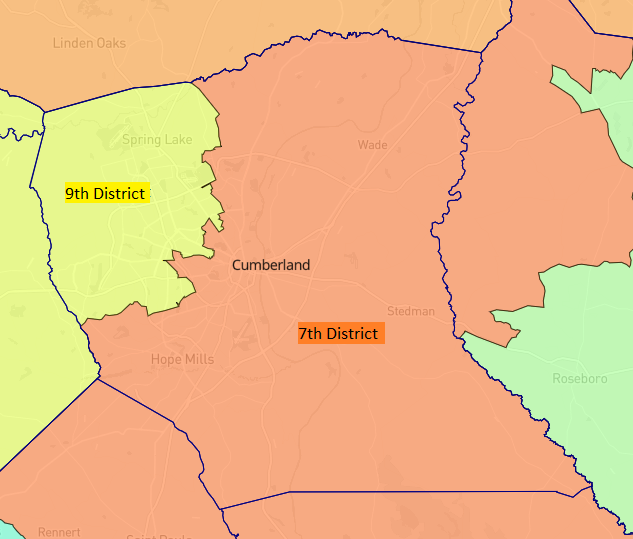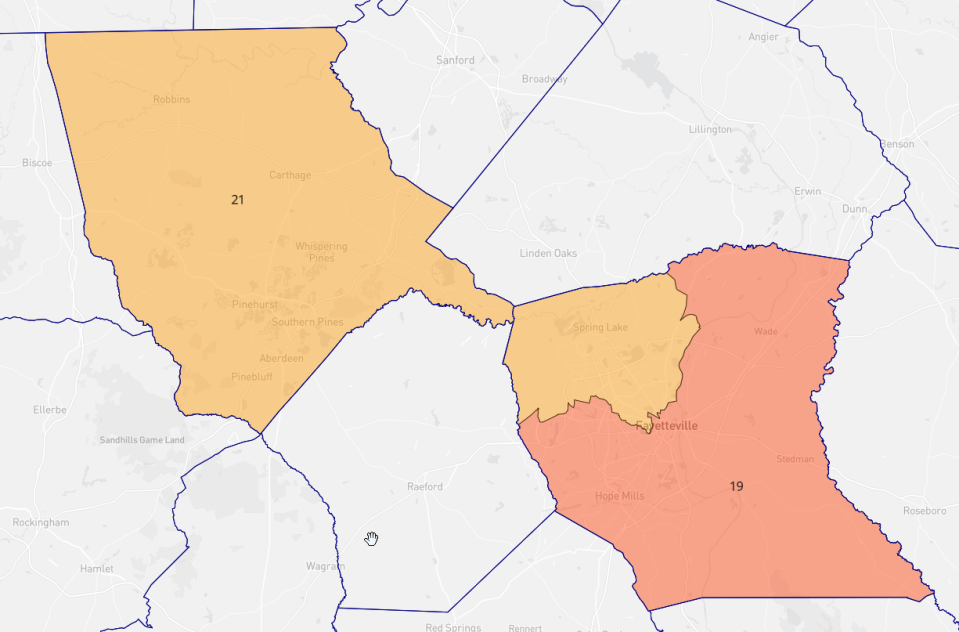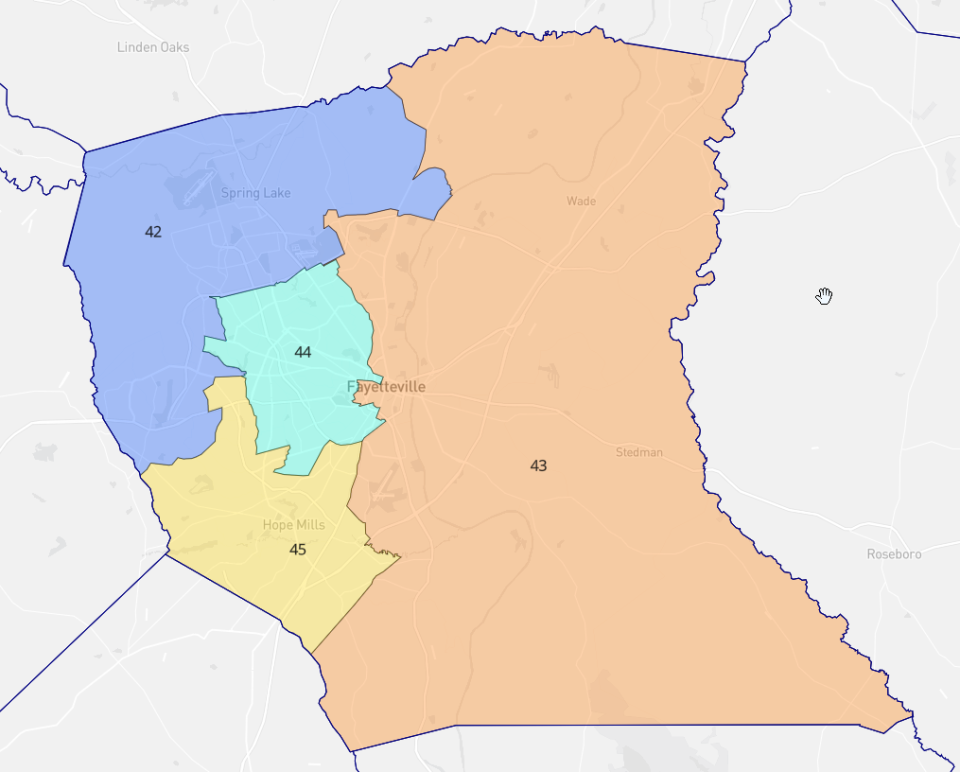New election maps boost GOP candidates in Cumberland County. How it affects your vote
North Carolina’s Republican-controlled legislature on Wednesday enacted election laws that will likely lead to more Republicans winning elections and fewer North Carolina Democrats serving in the General Assembly and Congress.
The new laws revise the shapes and borders of the voting districts for North Carolina’s 14 seats in the U.S. House of Representatives, its 50 seats in the state Senate and its 120 seats in the state House of Representatives. The districts were redesigned this month to replace temporary, court-ordered maps used in the 2022 elections following litigation on whether they were unconstitutionally biased. The new maps are for the 2024 through 2030 elections.
Since then, a North Carolina Supreme Court ruling said it is legal for the election district maps to purposefully favor Republican candidates to defeat Democratic candidates, and vice versa. The political parties in power typically design election maps to maintain and expand the number of seats their side holds in the legislature and Congress.
Rigging an election district map with the intention of favoring particular politicians or political parties and weakening or eliminating their opponents is known as gerrymandering.
Here are the changes to the legislative and Congressional districts that affect Cumberland County and North Carolina:
Democrats lose statewide in Congress, while Fayetteville keeps its two Republicans
North Carolina has seven Democrats and seven Republicans in Congress under the temporary Congressional map that was used in the 2022 election.
With the new Congressional map, according to an analysis by the John Locke Foundation, a politically right-leaning think tank, Republicans are favored to win 10 of the 14 Congressional seats in the 2024 elections, while Democrats are favored to win three. One district is expected to be a toss-up district.
The 2022 map had Fayetteville and Cumberland County divided between the 7th District and the 9th District. The 7th runs from Fayetteville to Wilmington, and has Republican Rep. David Rouzer of Wilmington. The 9th has part of Fayetteville, all of Fort Liberty, and includes counties clustered in the central North Carolina Sandhills and Piedmont regions. Republican Rep. Richard Hudson of Moore County serves the 9th District.

The new map also splits Fayetteville between the 7th and 9th Districts.
The 7th again runs to Wilmington.
The new 9th has parts of Fayetteville and Fort Liberty, and it runs toward Greensboro, circles around Greensboro and ends at the north border of Guilford County.
Hudson likes to promote that he represents Fort Liberty. Under this map, he loses the portions of Fort Liberty that are in Harnett County, including the Linden Oaks housing area. The Harnett County portions of Fort Liberty are being put into the new 13th Congressional District.
Past voting patterns indicate Republican candidates are favored to win the new 7th and 9th Congressional Districts. As a result, these races are more likely to be decided by Republican primaries than by general elections.

North Carolina Senate: Democratic district more blue to convert toss-up district into safe Republican district
Cumberland County has two state senators: Democrat Val Applewhite of Fayetteville in District 19, and Republican Tom McInnis of Pinehurst in District 21. District 21 is shared with Moore County.
Under the 2022 maps, District 21 had all of Moore County and the northwest corner of Cumberland County and north side of Fayetteville. District 19 had the rest of Fayetteville and covered Cumberland County’s southwest, southeast and northeast quadrants.
The new maps for 2024 to 2030 significantly change the district boundaries in Cumberland County. The new District 19 is largely confined to Fayetteville. The new District 21 circles around Fayetteville from Fort Liberty and Spring Lake to the north, most of the land east of the Cape Fear River to the east, and then the southern side with Cedar Creek, Gray's Creek, Hope Mills and toward the Rockfish area on the southwest.

The old District 21, served by Republican McInnis, was considered to be a toss-up district by the Locke Foundation’s political analysis in fall 2022. Despite it appearing to be a swing district in that election, McInnis defeated his Democratic challenger 54.6% to 45.4% — by more than 9 points.
The new District 21 is now classified R+10, a safe Republican district, where a Democrat has little chance of winning. The map-makers pulled Republican-favoring precincts from the 19th District to make the 21st District, and put Democratic-favoring precincts into the 19th District, to make the 21st District a solid red-voting district. The winner of its November 2024 general election will be decided in the March 2024 Republican primary.
The old District 19, served by Democrat Applewhite, was D+6, likely Democratic, under Locke’s 2022 analysis. Applewhite defeated Republican former state Sen. Wesley Meredith by 5.4 points: 52.7% to 47.3%.
The Locke analysis says the new District 19 is D+17, an extremely blue, safe Democratic seat. Republican voters living in the new District 19 in 2024 will have far less chance of electing a Republican than they did in 2022. Their voting power is being sacrificed to protect McInnis and any other Republican who seeks the District 21 seat. The winner of this 19th District’s November 2024 general election will be decided in the March 2024 Democratic primary.
Overall, the Locke analysis says:
In 2022, there were 11 competitive Senate districts, of which five leaned Democratic, two leaned Republican, and four were toss-up. There were 17 districts that favored Democrats and 22 districts that favored Republicans. Republicans won 30 seats in 2022 and Democrats won 20.
For 2024, there are 10 competitive Senate districts. Of these, five are toss-up, five lean Republican and zero lean Democratic. There are 17 districts that favor Democrats and 23 districts that favor Republicans.

NC House: Toss-up district made red, blue districts made more blue
Fayetteville and Cumberland County have four people in the North Carolina House of Representatives: Republican Diane Wheatley of the Linden area and Democrats Charles Smith of Fayetteville, Frances Jackson of Hope Mills and Marvin Lucas of Spring Lake. The new maps help Wheatley by moving her district from a toss-up rating to a lean Republican rating.
The new map further helps Wheatley by moving the home of Democratic former state Rep. Elmer Floyd out of her district and into the district served by Lucas — preventing Floyd from running against her in 2024. Floyd served for many years in the legislature and was planning to run again. Wheatley defeated Floyd in 2022 and he lost the Democratic primary in 2020.
A summary of the changes, and the Locke Foundation ratings:
District 42, served by Democrat Lucas, in 2022 was anchored in Spring Lake and includes Fort Liberty, western Fayetteville areas on the north side of Cumberland County. It was rated D+22, safe Democratic. The new map is similar but takes away some of west Fayetteville and the northern part of the county. It adds in portions of Fayetteville between Ramsey Street and Murchison Road on the city's eastern side. It becomes D+25, safely Democratic.
District 43, served by Republican Wheatley, was classified as a toss-up district by the Locke Foundation analysis for the 2022 election. It covers the largely rural southern, eastern and northeastern parts of Cumberland County. The revised District 43 picks up Republican-favoring precincts that were in the other three Cumberland County House districts. This shifts it to R+4, or lean Republican. Districts that are leaning are still considered competitive, just not as competitive as toss-up districts.
District 44, held by Democrat Smith, is in the central area of Fayetteville. It was D+13, safe Democratic, in 2022. For 2024, it’s rated D+16.
District 45, held by Democrat Jackson, has Hope Mills and western Fayetteville. It was D+8, safe Democratic, in 2022. The new rating for 2024 is D+9.

The Locke Foundation analyses for 2022 and 2024 say of the 120 House districts statewide:
25 seats were competitive in 2022, with six toss-up districts, 13 Democratic-leaning districts and six Republican-leaning districts.
For 2024, this becomes 26 competitive seats, with three toss-up districts, six Democratic-leaning districts and 17 Republican-leaning districts.
In 2022, 52 seats were likely or safe Republican seats. In 2024, this remains 52 seats.
Democrats had 43 seats classed as likely or safe for them in 2022. For 2024, this is 42 seats.
Senior North Carolina reporter Paul Woolverton can be reached at 910-261-4710 and pwoolverton@fayobserver.com.
This article originally appeared on The Fayetteville Observer: NC election maps reduce competitive elections in Cumberland County

